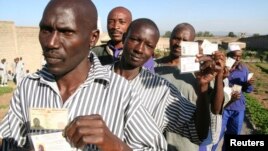13 November, 2014
Eighteen people in central Kenya are taking the country's secondary education test, called the KCSE. Even under normal conditions, this examination can make a student nervous. But these 18 students may feel especially fearful. They are serving sentences in a top-security prison. And if they do well on the test, they might get to leave the prison.
During the test the inmates sit at school desks at Naivasha Prison. These prisoners have writing tools and plastic devices used in mathematics. The classroom looks like any other except that the students are wearing prison uniforms.
David Noah Okwemba has just finished the examination for history and biology. He says he wants people to know that the prisoners are no longer criminals. Instead, he says they are students.

In this 2010 file photo, Kenyan prisoners line up to vote in Kenya's referendum in Naivasha. (REUTERS/Antony Gitonga/File photo)
Prisoners who perform well can have their sentences amended. They may be released early to go to university or find employment.
Patrick Mwenda is head officer at Naivasha prison. He says Naivasha works with the high courts to consider the cases of prisoners who get high marks.
Mr. Mwenda says nine prisoners have been released since 2008 as a result of their schooling and tests. So far, the releases have gone only to prisoners sentenced to short terms.
Only one other possibility for freedom exists for those facing life in prison and those who have used up all their legal appeals. Kenya's Power of Mercy committee advises about pardons for prisoners. Officials set up the committee in 2011.
Mr. Mwenda admits the difficulties of getting a pardon. But he says the prison urges students with longer sentences to build skills. He says doing this would help them have a good record to show the committee.
Inmate Prince Winsor Mosii does not approve of the whole system.
"The Power of Mercy is not actually helpful. It is there, but it is not helping in setting us at liberty (freeing us), even if you have performed."
Prince Winsor Mosii is serving a life sentence for his involvement in an armed robbery. He took his KCSE exam last year. He teaches English, biology and agriculture. But he says he does not see much reason to get an education if he is to remain in prison.
"It is of no good to get or to acquire something of great value, skills, and not put it into action."
More than half of the 3,000 inmates at the Naivasha prison are involved in the school program. Others may learn job skills like working with clothing and wood.
For supplies, the program depends on donors, other supporters and money from selling products made by the students.
The inmates themselves choose the subjects and decide the content of the studies. Personal experience makes up an important part of the class discussions.
I'm Jeri Watson.
VOA Correspondent Gabe Joselow reported this story from Kenya. Jeri Watson wrote it for Learning English. Caty Weaver was the editor.
______________________________________________________________
Words in this Story
uniform - n. a special kind of clothing that is worn by all the members of a group or organization
inmate - n. a person detained in a prison or mental institution
probation - n. a situation or period of time in which a person who has committed a crime is allowed to stay out of prison if that person behaves well, does not commit another crime, etc.
pardon - n. an act of officially saying that someone who was judged to be guilty of a crime will be allowed to go free and will not be punished
Now it's your turn to use these Words in this Story. In the comments section, write a sentence using one of these words and we will provide feedback on your use of vocabulary and grammar.